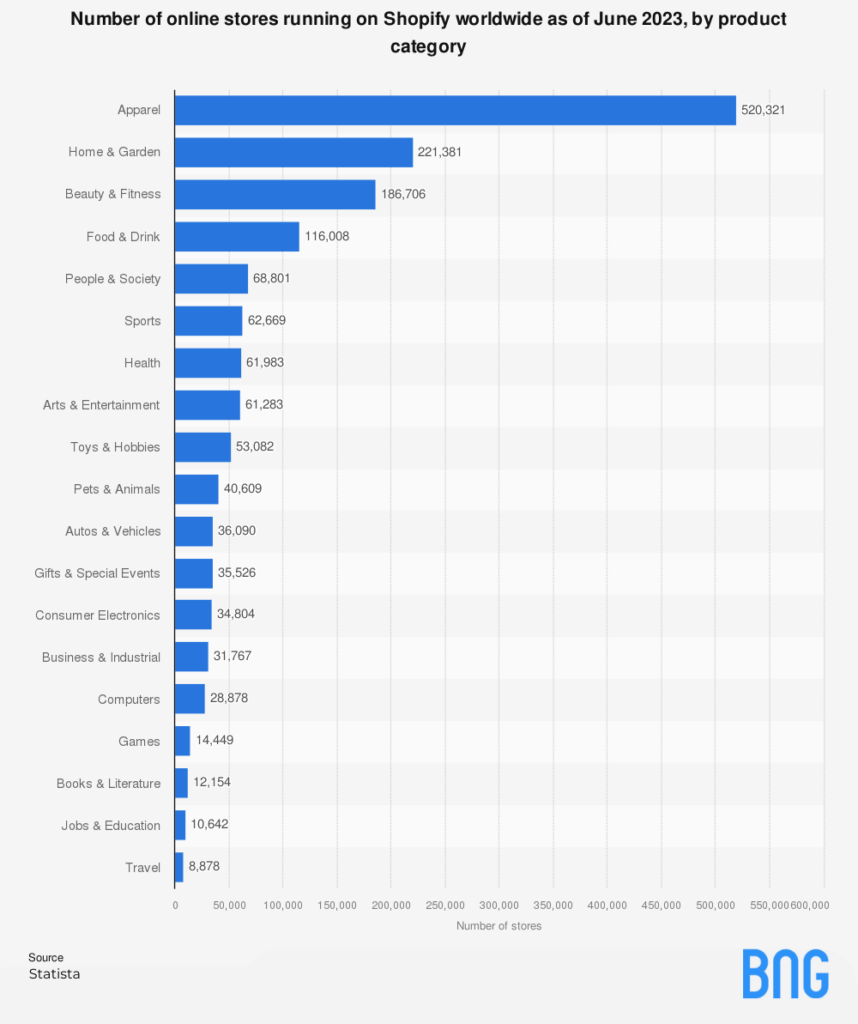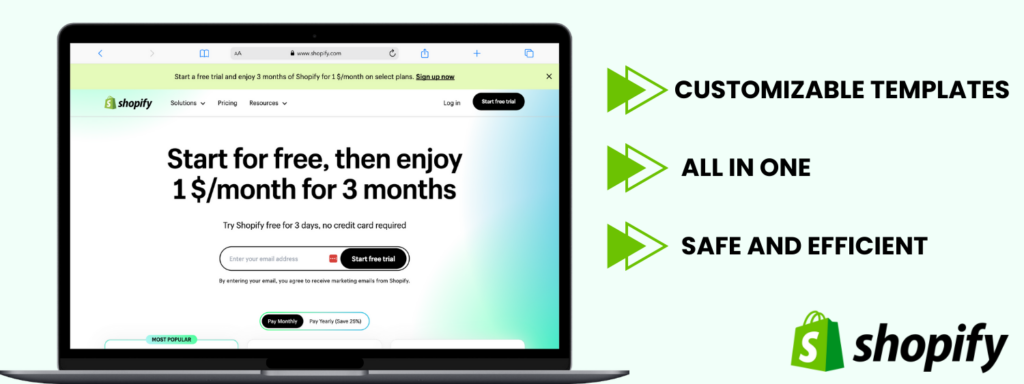What is Shopify?
Shopify is a cloud-based, SaaS (Software as a Service) platform that enables you to create an online store and sell products or services. Its user-friendly interface and diverse set of tools allow businesses to design, set-up, and manage their stores across multiple sales channels.
Did you know that according to statistics provided by Statista, apparel stores are the most popular types of stores on Shopify? Let’s take a closer look at the official number of stores running on Shopify as of June 2023:

The next most popular type of store category on Shopify is Home & Garden, with roughly 221,381 stores available on site. Although that’s the second-highest number of stores, it’s still much behind apparel stores which reached a whopping number of 520,321. The third most popular category is Beauty & Fitness, with 186,706 stores available on site.
As we take stock of these impressive numbers, it becomes clear that Shopify’s robust platform provides a fertile ground for a vast array of businesses, whether they’re rooted in apparel, home and garden, or beauty and fitness.

How Does Shopify Work?
Starting with Shopify is as simple as pie. You can set up your Shopify Store in a few simple steps:
Step 1: Set up your Shopify Account
Step 2: Select a range of appealing, customizable themes
Step 3: Add products
Step 4: Set up payments and shipping methods
Step 5: Sell through web, mobile, social media, online marketplaces and physical locations
What’s more, the platform seamlessly integrates with various apps, enhancing its functionality further. Check out our article on how to open a Shopify store to find out more.
Why Use Shopify?
Shopify provides a wide range of tools and features. The following are some of the reasons why entrepreneurs and businesses prefer Shopify:
Effortless Setup
Shopify’s interface is designed with the user in mind. It doesn’t require technical expertise to set up an online store, making it ideal for beginners and experts alike.
MORE: How much does Shopify cost?
Security & Reliability
Security is paramount in e-commerce, and Shopify shines here. It provides an SSL certificate for your store and ensures PCI compliance for secure transactions.
Scalability
As your business grows, Shopify scales with you. From small ventures to enterprise-level operations, Shopify has the right plan and resources for all.
MORE: Everything you need to know about Shopify reports
SEO & Marketing Tools
Shopify provides a suite of SEO and marketing tools to drive traffic to your store, helping you climb the search engine rankings.
MORE: How does Shopify branding work?
What is Shopify Used For?
It’s primarily used for building online stores or e-commerce websites, allowing businesses to sell both digital and physical goods. Here are some key uses of Shopify:
- Creating Online Stores: Shopify provides tools and templates for building aesthetically pleasing and user-friendly online stores without the need for advanced coding skills.
- Inventory Management: Businesses can keep track of their inventory, manage stock levels, and organize products thanks to Shopify.
- Payment Processing: The platform comes with built-in payment processing capabilities, known as Shopify Payments. It also integrates with many third-party payment gateways.
- Marketing and SEO: The SEO features included in the platform help your store rank higher in search engine results. Shopify also integrates with social media platforms for marketing purposes and supports email marketing campaigns.
- Analytics and Reporting: Shopify provides analytics tools that give insights into customer behavior, sales, and other important metrics. This helps businesses understand their performance and make informed decisions.
- Mobile Optimization: All Shopify themes are mobile-responsive, and it also provides a mobile app to manage your store on the go.
- Shipping and Fulfillment: Shopify integrates with various shipping carriers and offers features to streamline order fulfillment.
Who Uses Shopify?
Entrepreneurs and Start-ups
Entrepreneurs and start-ups love Shopify for its ease of use and swift set-up. When starting a new business, the last thing you want is a cumbersome and complex website to manage. Shopify’s intuitive interface and comprehensive ecommerce tools make it the perfect launching pad for new ideas. It requires no technical know-how and offers plenty of ready-to-use templates to get your online store up and running quickly.
If you’re thinking of starting a business of your own on Shopify, then make sure to check out what you can name your Shopify Store with our Shopify Business Name Generator.
Example: Taylor Stitch
Small to Medium-Sized Businesses
Small to medium-sized businesses (SMBs) constitute a significant part of Shopify’s user base. These businesses, often operating in niches, need a flexible, affordable, and robust platform to support their ecommerce activities. With Shopify’s scalability, these businesses can grow without worrying about outgrowing their website platform.
Example: Skinny TeaTox
Large Enterprises
Large enterprises also utilize Shopify, specifically Shopify Plus, which offers additional features tailored to the unique needs of high-volume merchants and large businesses.
Examples: Companies like Gymshark, Heinz, and Staples Canada use Shopify Plus to manage their complex ecommerce operations.
Brick-and-Mortar Stores
Traditional brick-and-mortar stores that want to expand their operations online often choose Shopify for its seamless omnichannel capabilities. Shopify’s point of sale (POS) system integrates the physical and digital selling environments, which is a great advantage for businesses operating both in physical and virtual spaces.
Example: Beauty Heroes
Artists and Craftsmakers
Artists, craft makers, and creatives use Shopify to sell their unique products. Whether it’s handmade jewelry, digital prints, or custom clothing, Shopify provides the tools necessary for these creatives to showcase their work, reach a wider audience, and ensure secure transactions.
Example: Sanrio
Dropshipping Businesses
Shopify is a popular choice for entrepreneurs running dropshipping businesses. Shopify’s integration with dropshipping apps like Spocket simplifies product sourcing and management, making it easier for these businesses to operate smoothly.
Example: Notebook Therapy
What is Shopify Pricing?
Shopify has three main pricing plans, and two additional ones. Prices range from 24 USD to 2000 USD per month. All the plans have a monthly and a yearly version, and include various features. To find out more, we recommend checking out our article on how much Shopify costs.
What Can I Sell on Shopify?
Here’s an overview of what you can sell on Shopify:
- Physical Products: These are tangible items that you ship to customers, such as clothing, furniture, handmade goods, etc.
- Digital Products: These are non-tangible items that customers download directly from your store. Examples include eBooks, music, digital art, and online courses.
- Services: If you’re a consultant or provide professional services like photography, home renovation, or car repairs, you can sell these on Shopify.
- Memberships: Shopify can be used to sell subscriptions for ongoing services, or memberships for gyms, clubs, and other institutions.
- Ticketed Experiences: You can sell tickets to workshops, concerts, cooking classes, or other events.
- Classes and Lessons: If you’re a teacher or instructor, you can sell your classes or lessons (courses) through Shopify.
- Consultations: Professionals in fields like interior design, coaching, and more can use Shopify to book client consultations.
Do keep in mind that while Shopify enables the sale of a wide range of products and services, all items must comply with Shopify’s Acceptable Use Policy and not violate the laws of any jurisdiction where they’re sold or delivered.
Shopify Pros and Cons
Every platform has its strengths and weaknesses. Let’s break it down for Shopify:
| Shopify Pros | Shopify Cons |
|---|---|
| Shopify’s interface is intuitive and user-friendly, making it easy for anyone to set up and run an online store, regardless of their technical expertise. | Transaction fees apply unless using Shopify Payments. |
| Shopify’s range of plans and customizable options mean it can scale with your business as it grows. | Advanced features require higher-tier plans. |
| Shopify offers a built-in payment gateway, Shopify Payments, along with integration with many other popular payment processors. | Basic Shopify plans lack native cross-selling and upselling features, requiring third-party apps to implement these sales strategies. |
| Shopify provides secure and reliable hosting with fast loading times and excellent uptime. | Despite having SEO tools, Shopify has some SEO limitations, like not being able to customize the structure of URL tags. |
| Shopify’s app store offers a wide range of extensions and plugins to extend the functionality of your store. | If you decide to move your store from Shopify to another platform, the process can be complex and time-consuming, with potential SEO complications. |
Is Shopify Right For My Business?
Whether Shopify is right for your business depends on several factors including the nature of your business, your technical skills, and the scale at which you operate. Shopify is a great choice if:
- You’re a small to medium-sized business. Shopify caters well to small and medium-sized businesses due to its user-friendly interface and cost-effective plans.
- You want to start selling quickly. Shopify allows you to get your store up and running quickly with minimal technical knowledge. It offers a variety of customizable themes and apps to enhance the functionality of your store.
- You’re looking for a comprehensive solution. Shopify is a comprehensive e-commerce solution that offers everything you need to start, run, and grow your business online. This includes website builder, hosting, payment gateway, inventory management, SEO, analytics, and more.
- You want scalability. Shopify is a scalable platform that can grow with your business. As your sales increase, you can upgrade to a higher plan to access more advanced features.
However, if:
- you require a high degree of customization,
- have complex requirements that go beyond Shopify’s capabilities,
- or if you’re operating on a larger scale and need more advanced features, then you may want to explore other e-commerce platforms or consider a custom-built solution.
MORE: Shopify vs. Shopify Plus
Takeaway Points
Shopify has been a game-changer in the e-commerce arena. Its seamless user experience, coupled with a vast array of features and tools, make it a worthy contender for anyone seeking to start an online business. However, like any platform, it isn’t one-size-fits-all. Thoroughly evaluate the pros and cons and ensure it aligns with your business requirements before diving in.
At the end of the day, Shopify stands out as a potent, all-in-one e-commerce platform that has the power to turn your business vision into reality. Thanks to Business Name Generator, you can find the perfect name for your Shopify store, and enjoy all the perks of your new business.